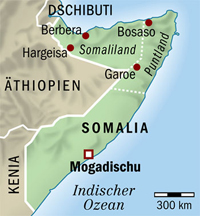Somalia: 5,000 people gather for anti-Ethiopian protest
The protesters, gathered in a stadium in northern Mogadishu, chanted anti-Ethiopian slogans and carried signs that said, "We Must Fight Them!" Ethiopia, a largely Christian country, is the traditional enemy of largely Muslim Somalia.

Such protests have been organized by Islamic militants who are accused of links to al-Qaida and have seized control of the capital and a large part of southern Somalia. The government holds only one town, is militarily weak, undermined by internal rivalries and includes warlords accused of dragging the country into anarchy.
Ethiopian and Somali government officials have denied Ethiopian troops are in the country, but Somali witnesses in several towns reported seeing them cross from Ethiopia four days ago and go first to Baidoa, the only town held by the government, and then to nearby Wajid.
Somali government leaders may be reluctant to acknowledge that Ethiopian troops have come to their aid because they do not want to appear to be beholden to the country's traditional adversary. Anti-Ethiopian sentiment still runs high here.
Sunday, a top Islamic leader, Sheik Sharif Sheik Ahmed said: "I call on Somalis to be ready for a holy war against an invasion from the enemy of the religion and the country."
Ethiopia's move could give the internationally recognized Somali government its only chance of curbing the Islamic militia's increasing power. But the incursion could also be the pretext the militiamen need to build public support for a guerrilla war.
Somalia has not had an effective central government for 15 years since warlords overthrew dictator Mohamed Siad Barre in 1991 and then turned on each other. Some of those warlords now sit on the transitional government.
Earlier Monday, a Somali warlord and 150 of his militiamen offered their support to the government. Mohamed Qanyare Afrah arrived in the central town of Baidoa, the seat of President Abdullahi Yusuf's government, at 4:30 a.m. (0130 GMT), said Mohamed Dooli, one of Qanyare's militia commanders.
Qanyare was among a group of secular warlords and their allies who fought the Islamic militia for control of Mogadishu between February and June in battles that killed 400 civilians, according to a report Sunday from a Somali human rights group.
The secular warlords, who reportedly had been backed by the United States, were routed and Qanyare retreated to his home village in central Somalia, where Islamic militia pursued him to try and force him to surrender his weapons, Dooli said. Qanyare was able to reach Baidoa, 240 kilometers (150 miles) northwest of Mogadishu, with eight pickups mounted with machine-guns, the main mobile weapon in Somalia.
Prime Minister Ali Mohamed Gedi had fired Qanyare from the Cabinet because he had waged his war on the Islamic group independently of the government. But Monday, Qanyare, the former national security minister, was welcomed by members of the transitional parliament and local administrators, Dooli said. He was scheduled to meet with Yusuf, Gedi and the speaker of parliament later Monday.
Subscribe to Pravda.Ru Telegram channel, Facebook, RSS!





